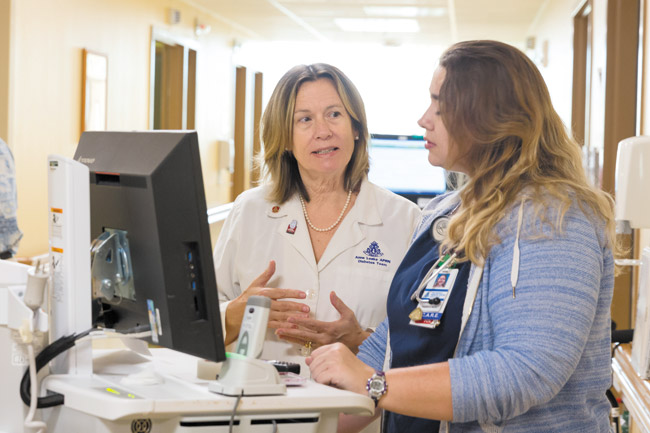Diabetes Care, Education Center
Dr. Anne Leake
Family nurse practitioner with the Diabetes Management and Education Center at The Queen’s Medical Center-West Oahu
Where did you receive your schooling and training?
My bachelor’s degree in psychology is from University of Pennsylvania, my master’s in nursing is from Pace University in New York, and my Ph.D. in nursing is from University of Hawaii at Manoa. I am board certified in advanced diabetes management by American Association of Diabetes Educators. I am trained as a lifestyle coach and facilitator for PILI Ohana, a lifestyle intervention, and I have CDSMP (Chronic Disease Self-Management Program) training from Stanford University.
mw-dih-dranneleake-bc-3
How long have you been in practice?
I was a nurse practitioner in primary care for 34 years and, now, a diabetes specialist for three years. I am a family nurse practitioner with the Diabetes Management and Education Center at The Queen’s Medical Center-West Oahu
What drew you to working in the field of diabetes care?
My father had type 2 diabetes, so I saw up close how hard it was for him to change his diet. Coming to Hawaii, I saw so many patients struggling with diabetes. I was drawn to research in diabetes because of its outcome measure of the hemoglobin A1c that provides a good average measure of how people are doing. I also thought if I specialized in diabetes, I would learn how to prevent diabetes in myself and my family.
What are the main functions of Queen’s-West Oahu’s Diabetes Education Program?
We strive to reduce the burden of diabetes in West Oahu communities. We provide education to individuals and in classes with a team of educators, including myself, a nurse and a nutritionist who also has a degree in kinesiology. I do medical management of patients and can prescribe medications and order tests while keeping the primary care provider informed about progress. I have experience with the latest medications and technologies with which PCPs may have less experience. We see patients for follow-up after education sessions and annually for a “booster dose” to stay informed about new research or guidelines. Starting next year we will begin diabetes-prevention programs with our employees that I hope we will be able to offer to the community in the future.
Can you talk about the significance of having the program in West Oahu?
Two large ethnic groups in West Oahu are Filipino and Native Hawaiian. Filipino Americans nationally have been identified by American Diabetes Association as having a prevalence of diabetes above the national average, and all Asian Americans must keep their weight down (BMI under 23) to avoid diabetes. Native Hawaiians and Pacific Islanders have the highest rates of diabetes in our state. This is why it’s so important to have a diabetes center in West Oahu. We want to have an impact so more people can live well with diabetes and fewer will suffer from complications of diabetes such as dialysis, amputations and loss of vision.
The program recently was awarded an Education Recognition Certificate from American Diabetes Association. What characteristics earned the program this distinction?
We had to identify and describe the population we would serve and submit a de-identified medical record of one patient who went through our program. We had to supply one section of our curriculum Partners in Care. We had to demonstrate competence and credentials for the staff, and create and meet with a community advisory board comprised of patients, doctors and staff. Our program had to be comprehensive, address the seven self-care behaviors patients need to do to stay well, and focus on the patient and their goals. There must be follow-up that tracks progress toward goals, as well as hemoglobin A1c results. And information about patients must go back to the primary care provider. In one year we will submit a report about our progress and next set of goals to the ADA.
Anything else you’d like to mention about the Diabetes Management and Education Center?
We are assessing the level of distress our patients have about diabetes using a survey that quickly identifies if there are problems and in what areas. As diabetes educators, we can address — and hopefully reduce — distress with the regimen, the emotional burden of having diabetes, and interpersonal or physician-related distress. As a startup, we have capacity and can see people quickly. We do require a referral from a physician or nurse practitioner and will seek that referral if requested.
For more information, visit queenswestoahu.org/diabetes or www2.jabsom.hawaii.edu/pili/curriculum/partners-in-care.html.






